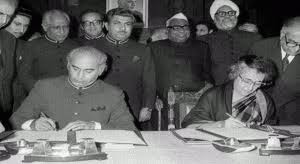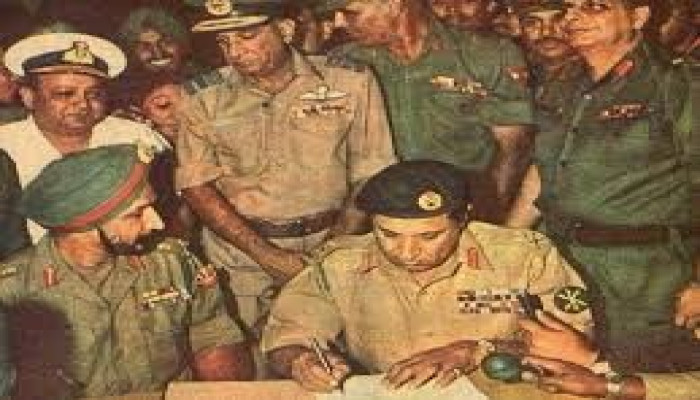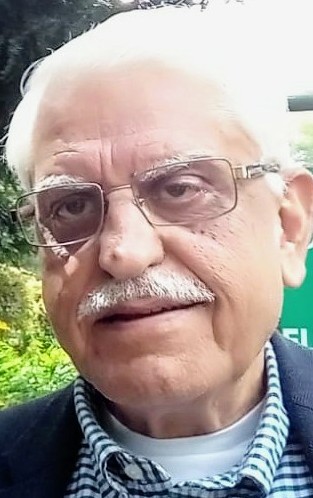Vijay Diwas: A Monumental Account of Two Surrenders that Changed the Geopolitical Dimensions of Indian Subcontinent
- In Current Affairs
- 10:43 PM, Dec 16, 2024
- Vijaya Dar
Pakistan’s Surrender at Dhaka on 16th December 1971 Quickly Followed by Indira’s Surrender at Shimla on 2nd July 1972
Today is the 53rd anniversary of the event that happened in Dhaka on the 16th of December 1971, when Pakistan, its armed forces, and a belligerent Nixon-Kissinger political duo in the US, received the humiliation all of them so richly deserved. For the first time in recorded history a military surrender ceremony was conducted as a public event, attended by lakhs of witnesses. The Pakistani General Niazi was made to put his signature on the surrender document, not inside a military tent, but in full gaze of the public that had turned up to savour the complete humiliation of a marauding army that knew nothing of honour or valour. The humiliation of 1971 and the loss of East Pakistan temporarily put a halt to Pakistan’s aggressive pursuit for a national identity for some time. But this was only a temporary halt.
It is my belief that Indira Gandhi made a grievous mistake when she sought the dismemberment of Pakistan and supported the creation of an independent Bangladesh out of East Pakistan. The Shimla agreement could have been radically different from the abject surrender our Prime Minister made to the charms of the wily Bhutto. The breaking away of the Bengali part of Pakistan removed whatever checks this part of the principally Islamic country exercised on the military adventurism of the Generals from West Pakistan. That Bangladesh, whose birth we midwifed, would bare its fangs so soon and turn upon its saviours should have been anticipated by the political think-tank that advised the then Prime Minister Indira Gandhi.

Surrender at Shimla
At Shimla, in July 1972, Indira Gandhi should have insisted on the following points before returning the 93000 POWs captured during the war:
1. Pakistan would remain a whole entity and there would be no support for the creation of Bangladesh. (Sheikh Mujib should have been invited to be a part of this conference.)
2. Sheikh Mujib’s Awami League, which had won the National Elections of Pakistan, would be invited to form the Government of Pakistan with him as the Prime Minister.
3. All civilian refugees from East Pakistan would be repatriated from India and sent back to their home
4. All Indian POWs held in Pakistan would be honourably returned to India.
5. Only on fulfilment of the above 4 conditions would India release the 93000 Pakistani POWs.
6. An agreement would be signed with Sheikh Mujib and Bhutto ratifying that the Government of Pakistan would recognise the LoC in Jammu & Kashmir as the International Border between the two countries. This agreement would be made inviolable and a suitable resolution passed in the Pakistan National Assembly.
However, today there is so much water under the bridge. Indira Gandhi and her advisers missed a fabulous opportunity to not only settle the Kashmir dispute but to end the state of hostility that Pakistan nurtured against India from the first day of its existence. Pakistan would have remained whole, and the large role played by the eastern wing in shaping its political and economic future would perhaps have allowed for a more reasonable polity to emerge in the undivided Pakistan.
Freed from having to worry about a part that was so different from the West Pakistanis, not only in language, literature, history, culture and an understanding of Islam, it was Zia-ul-Haq, who after seizing power, struck upon the idea of giving Pakistan a whole new identity.
Farzana Shaikh, Associate Fellow of Chatham House, and author of Making Sense of Pakistan argues that “conflicting visions over the role of Islam in Pakistan have made it impossible to reach a broad consensus over fundamental questions about the purpose of Pakistan, or, indeed about the precise relation between ‘being Muslim’ and ‘being Pakistani’. This lack of consensus, she suggests, “gravely impeded the development of a coherent national identity for Pakistan.” The lack of a national identity has resulted in the emergence of a “negative identity” predicated on Pakistan’s opposition to India.
“One of the most significant implications of this ‘negative identity’ that rests on no more than being ‘not India’ has been to dilute Pakistan’s South Asian roots in favour of a more robust Islamic profile informed by the Islam of West Asia. The implications of this imported theology have been deeply damaging to Pakistan, “where the broadly pluralistic instincts, characteristic of local varieties of Islam have been forced to give way to harsher readings of Islam imported from abroad”. The transformation of Pakistan during the Zia years has had lasting effects on the psyche of its people who have been misguided to believe that they are a Muslim country chosen to become the guarantors of Islam in the world. It has also resulted in Pakistan denying its pre-Islamic legacy, and suppressing the culture, the history, the arts and the literature of the Hindu, Buddhist, Jain and other non-Muslim eras.
This suppression has deep psychological implications for its people. Having been forced to deny their past, a large vacuum has been created in their consciousness. Lies, hatred and notions of victimhood are filling this vacuum. People are being made to believe that they are being victimised and persecuted by the rest of the world for pursuing their faith. Lies and deceit have become ingrained in the Pakistani consciousness.
It is this version of Wahhabi Islam that Pakistan tried to export to Kashmir through its lackeys in the Hurriyat and other subversive institutions, with the hope that it would turn the Muslims of the valley against their traditional ethos and make them the instruments of success in breaking Kashmir away from the Indian Union. Pakistan, I am afraid, has largely succeeded in its designs. The people of the Kashmir valley have fallen prey to this invidious propaganda and have driven the Hindus and other non-Muslims out of the valley through terror and murder.
Today if we are witnessing a modicum of normalcy in Jammu & Kashmir, it is just superficial in nature. Deep down the Kashmiri Muslim does not identify with India, but is currently forced to lie low, as he needs the Indian tourists to keep him fed and comfortable. Pakistan’s inability to finance the insurrection has also tied his hands, but his mind is still in control of the mullahs and jihadi indoctrinators unleashed in the valley after Operation Gibraltar.
The periodic murderous attacks on unarmed Hindu civilians eking out a living in the valley, should remind us that there is no change in the hearts and minds of the Kashmiri Muslims after August 5, 2019. Withdrawal of Article 370 has made no difference whatsoever to the lives of the minority community of Kashmir. They will not return to their homes because there is no change in the hatred and hostility that their erstwhile neighbours harboured for them within their bosoms. A community under siege has found refuge elsewhere in India and all over the world. There is no chance that any one of them will desire to return as nothing else but gun fodder.
Coming back to the 1971 war and the abject political surrender made by Indira Gandhi at Shimla, today we are witnessing the unravelling of that euphoria that was generated by the Dhaka surrender ceremony. Not only has Bangladesh returned to becoming a lapdog of Pakistan, but has also begun to bare its fangs on the hapless Hindus who stayed behind after 1971. It also has the temerity to bark at India and threaten us with some kind of military adventure.
Far from celebrating 16th December, we should be mourning the loss of so many precious lives of our jawans, who went bravely to their deaths not knowing that the political leadership in Delhi would stab them in the back as they were falling from the enemy’s bullets. Not only did Indira Gandhi fail to repatriate the millions of East Pakistani refugees to Bangladesh, but also she did not even demand the honourable return of our POWs from Pakistan.
These unfortunate soldiers were left to die in Pakistani prisons, unknown and unlamented by their countrymen. Their blood cries for revenge, but these fall on deaf ears. Yes, by all means, call it Vijay Diwas or Shaurya Diwas, and remember our brave military heroes, but please do not eulogise Indira Gandhi, her father, and the Congress party. They betrayed India at every juncture; right from the day they took office in 1947. Today, they continue to do the same through Indira’s daughter-in-law and her children.
Images provided by the author.
Disclaimer: The opinions expressed within this article are the personal opinions of the author. MyIndMakers is not responsible for the accuracy, completeness, suitability, or validity of any information on this article. All information is provided on an as-is basis. The information, facts or opinions appearing in the article do not reflect the views of MyindMakers and it does not assume any responsibility or liability for the same.







Comments